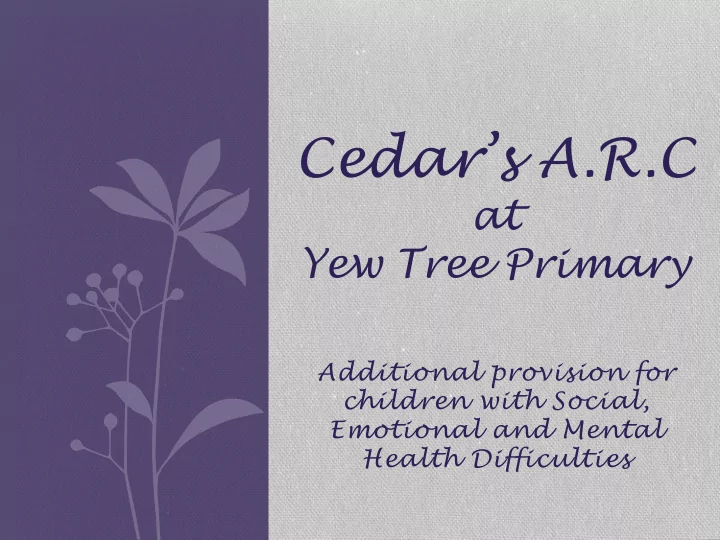

Cedar’s A.R.C at Yew Tree Primary Additional provision for children with Social, Emotional and Mental Health Difficulties
Social, Emotional and Mental Health difficulties in Children. • Half of all diagnosable mental health disorders are established by the age of 14, when children are in still an educational setting. • On average, two or more children in every primary school class will have a diagnosable mental health condition – and one child in eight will have one or more mental health conditions at any time. • One quarter of children and young people experiencing mental health problems are seen by specialist mental health services.
Th The e A.R. R.C C Ethos The A.R.C offers a very nurturing environment where a child’s emotional well-being is our prime concern. We want the children to develop a sense of belonging and for them to feel safe, both physically and emotionally. This will then ensure that they are best placed to develop their emotional and social skills. To ensure they feel comfortable and secure enough to do this, we will comfort and support them as a parent would.
Maslow’s Hierarchy of Need
A.R. R.C Plac acem ement ents Referrals are made by a pupil’s school. A member of the A.R.C Team visit to discuss the child’s needs with teaching staff and, where possible, to observe the pupil. This visit, along with the referral documentation then informs the A.R.C Panel’s decision regarding a placement. There are 8 places available and children are selected to attend based on their personal circumstances and individual needs. Placements are initially offered for eight weeks or may be offered indefinitely, depending on the needs of the child. They are reviewed at each Panel meeting.
Referrals and Placements Panel Date Referrals Placement Placement Offered Denied 13 th October 2016 1 1 0 1 st December 2016 8 5 3 13 th February 2017 3 2 1 30 th March 2017 1 1 0 18 th May 2017 3 3 0 6 th July 2017
Attac achme hment nt Disorder order Many of the A.R.C pupil’s display signs of having attachment issues. Ambivalent Attachment Avoidant Attachment Disorganised Attachment
SEMH and Comorbidity Pupil SEMH Attachment ASD ADHD p p TL p p IP p p p HH p p ZA p p p CC p p p HM p p MP p p p p JJ p p BR p p p FI p p SS
Pupils who attend the A.R.C full time, start their day with time to reflect and share news or information from outside of school. Breakfast is available for those who wish to have it and we ensure that we all sit together around the A.R.C dining table, not only to promote a family environment, but also to encourage and develop speaking and listening skills. Whilst academic work is not the primary focus of the A.R.C, Phonics, Reading, Writing and Maths activities are completed during morning sessions with pupils who attend full-time and are tailored to suit each child’s needs and abilities. Pupils work on a 1 -1 basis with their key worker during these sessions. This is to ensure they are both adequately supported or challenged appropriately .
Our afternoon sessions follow a half-termly, creative theme, which not only encourages pupils to be innovative and develop the ability to problem-solve in all areas of the curriculum, but also allows them time to talk and reflect on personal issues, worries or events. Structured play is also delivered to help promote social skills and build relationships. Modelling of social skills and helping the children to develop a better understanding of their own emotional needs and regulation, is a key part of the work carried out in the A.R.C and is delivered through focussed social and emotional activities, therapeutic stories and the PSHE scheme of work, ‘Jigsaw’.
Life skills such as cooking and gardening are also part of our afternoon sessions and encourage the children to be healthy and independent, as well as giving them a practical opportunity to develop their Maths and Science knowledge. The children also take part in Forest School and Music sessions. There are also opportunities available for them to access outside agency support, should they require counselling or more specific social or emotional therapies. During the Summer term, this has included Relationship Therapy and having a Pet Therapy Dog visiting weekly.
Challenges • Limited ‘set - up’ budget. • Underestimation of staffing requirements. • Transportation of part-time pupils. • No ongoing resource budget. • Delays in finding suitable provision for wrongly placed pupils. • Negative feelings by some schools to reintegrate pupils. • Use of Boxall Profile as an assessment tool. • Safety of staff and pupils. • Time and funding of additional staff training.
Adaptions that were made over the year • A.R.C. outreach work developed. • Staff from Yew Tree used to help with staffing ratios. • Supplies from Yew Tree used for resources. • Panic alarm system installed. • Additional fencing added to building. • Braveheart Training undertaken. • Development of outdoor area. • Big Happiness Experiment staff training.
Successes for the Year. • 1 pupil already successfully reintegrated back into their school. • 4 pupils are currently being reintegrated back to their main school. • 1 pupil has begun supported transition to Secondary school. • Placements found for 2 wrongly placed pupils. • 3 current pupils to continue to access the A.R.C. in September • Positive feedback from pupils’ schools. • Positive feedback from SISS monitoring. • Positive feedback from Parents and BHE workshop delivered. • Happy and settled Pupils. • Whole school training delivered regarding SEMH and Attachment. • Training of pupils’ 1 -1 support staff
Next Steps • New full-time member of staff to start September 2017. • All key workers to fulfill outreach role. • Proposed staff CPD to include; Art, Music and Lego therapies. • Proposed training and introduction of ‘Thrive’ approach and assessment tool. • Development of Author based SEMH and creative themes.
Recommend
More recommend